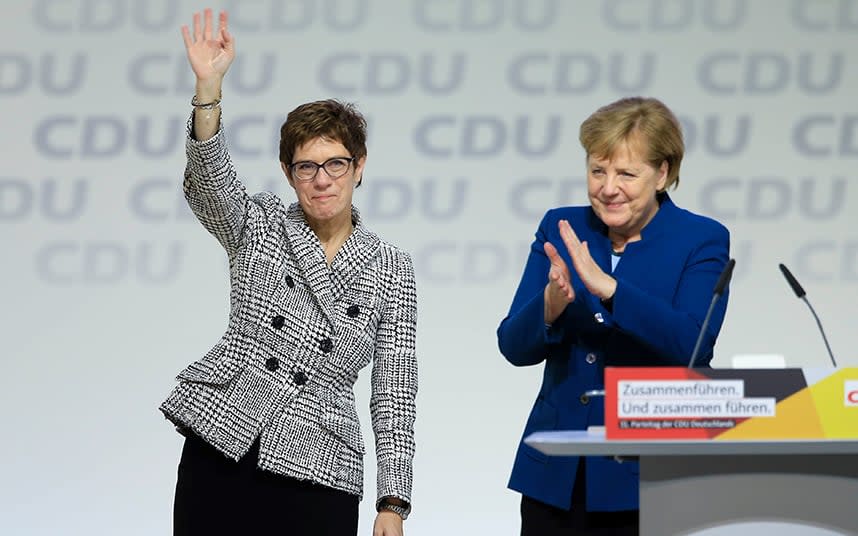'Mini-Merkel' AKK wins race to succeed German chancellor as leader of ruling Christian Democrats

Annegret Kramp-Karrenbauer was elected as the leader of Germany’s governing Christian Democrat party yesterday, leaving the protege of Angela Merkel as the German Chancellor's presumptive heir.
After winning a nailing-biting vote at a party conference in Hamburg yesterday the 56-year-old career politician known as “AKK” saw off the challenge of the millionaire lawyer Friedrich Merz to win by just 35 votes in a secret ballot of 1,001 delegates.
The narrow victory laid bare the CDU’s internal divisions after a string of poor election results following the 2015 migrant crisis, but now opens the door to a smooth transition for when Angela Merkel retires ahead of the 2021 general election.
The tight contest was the first time since 1971 that there had been any competition for the post of CDU party leader, a testament to disagreements in the party over how to handle the resurgence of the far-Right Alternative for Germany (AfD).

Mr Merz had demanded a “new strategy” to confront the populists, but Mrs Merkel struck back, using her valedictory speech to make a coded appeal for delegates to back Ms Kramp-Karrenbauer, the candidate seen as most likely to continue on her centrist path.
The veteran Chancellor reminded delegates that the last time the party scored a major victory had been in state elections in Saarland last year - the home state of Ms Kramp-Karrenbauer.
Likewise Ms Kramp-Karrenbauer used her impassioned last pitch to delegates to make clear that she also saw her responsibility as acting as a vanguard against populism, but in the same way Merkel has done.
“We are the last surviving strong centre-right party in Europe and I want to ensure that remains the case. That we are even in this situation is thanks to one person. I can only say from my heart - thank you Angela,” she said to resounding applause.
Mr Merz by contrast portrayed himself as the change candidate. In his speech he attacked the party leadership for failing to stop the rise of the AfD and described it as “unacceptable” that they had become the biggest opposition party in Germany’s parliament, the Bundestag.
The 63-year-old has spent a decade and a half away from frontline politics, making millions as a corporate lawyer, and his supporters saw him as the great hope for bringing the CDU back to its conservative roots.
In accepting victory, Ms Kramp-Karrenbauer made clear that it was now time for the two camps to reunite ahead of crucial state elections next year, offering an olive branch to Mr Merz by saying she wanted to work with him at the top of the party.

Ms Kramp-Karrenbauer spent decades in the backwaters of German politics, first as interior minister then as state leader in tiny Saarland on the French border. She was thrust into the spotlight in February when Mrs Merkel tapped her to take over as party-secretary following last year’s election flop.
Since then she has worked tirelessly to re-engage with the party membership, travelling the country to instigate debate on issues such as military conscription. Her challenge now, analysts warned, will be to heal divisions at the heart of her party.

